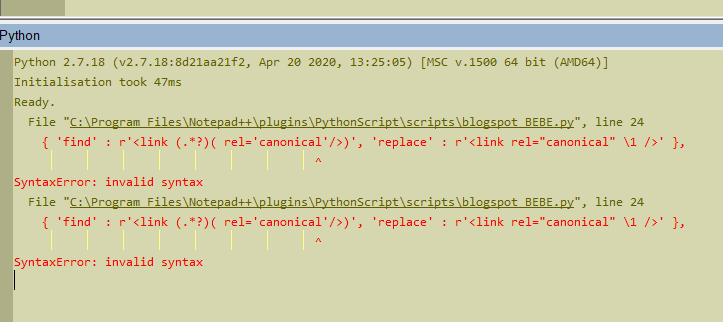Regex error: (SyntaxError: invalid syntax) on Python Script Plugin
-
hello. In my previous post, I update this Python script for making multiple search and replace in all files. And works just fine. The regex is very simple in that case.
# -*- coding: utf-8 -*- from __future__ import print_function from Npp import * import os import sys #---------- class T22601(object): def __init__(self): Path="C:\\python-test" for root, dirs, files in os.walk(Path): nested_levels = root.split('/') if len(nested_levels) > 0: del dirs[:] for filename in files: if filename[-5:] == '.html': notepad.open(root + "\\" + filename) console.write(root + "\\" + filename + "\r\n") notepad.runMenuCommand("Encodage", "Convertir en UTF-8") regex_find_repl_dict_list = [ { 'find' : r'foo', 'replace' : r'bar' }, { 'find' : r'bar', 'replace' : r'gaga' }, ] editor.beginUndoAction() for d in regex_find_repl_dict_list: editor.rereplace(d['find'], d['replace']) editor.endUndoAction() notepad.save() notepad.close() #--------- if __name__ == '__main__': T22601()Now, I test a much complex regex:
line 24 { 'find' : r'<link (.*?)( rel='canonical'/>)', 'replace' : r'<link rel="canonical" \1 />' },line 24 { 'find' : r'<link (.*?)( rel='canonical'/>)', 'replace' : r'<link rel="canonical" \1 />' },and I got this error: SyntaxError: invalid syntax So it is something about regex. But what ?
see this print screen.

-
maybe I forgot to use flags?
something like:
flags=re.MULTILINE{ 'find' : r'<link (.*?)( rel='canonical'/>)', 'replace' : r'<link rel="canonical" \1 />' }, flags=re.MULTILINE -
Don’t use single quotes inside single quotes, or double quotes inside double quotes
Do use double quotes inside single quotes, or single quotes inside double quotes
-
This post is deleted! -
On complex regex, remember this:
First, you must put
\before any'in your regex. otherwise it will give conflict with the Python syntax that also have the operator'You had to remove the
rafterfind :part. So, should be'foo'instead ofr'foo'In your default example should be (without :
rin front of'foo'{ 'find' : 'foo', 'replace' : r'bar' },Your code, with the new and complex regex, should be like this.
I write a second regex to see much better:
# -*- coding: utf-8 -*- from __future__ import print_function from Npp import * import os import sys #------------------------------------------------------------------------------- class T22601(object): def __init__(self): Path="C:\\python-test" for root, dirs, files in os.walk(Path): nested_levels = root.split('/') if len(nested_levels) > 0: del dirs[:] for filename in files: if filename[-5:] == '.html': notepad.open(root + "\\" + filename) console.write(root + "\\" + filename + "\r\n") notepad.runMenuCommand("Encodage", "Convertir en UTF-8") regex_find_repl_dict_list = [ { 'find' : '<link (.*?)( rel=\'canonical\'/>)', 'replace' : r'<link rel="canonical" \1 />' }, { 'find' : '(<meta content=\')(.*)(\' property=\'og:description\'/>)', 'replace' : r'<meta name="description" content="\2" />' }, ] editor.beginUndoAction() for d in regex_find_repl_dict_list: editor.rereplace(d['find'], d['replace']) editor.endUndoAction() notepad.save() notepad.close() #------------------------------------------------------------------------------- if __name__ == '__main__': T22601()